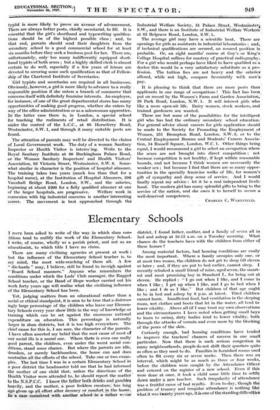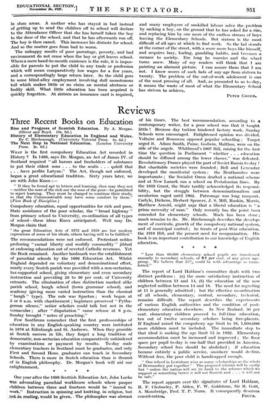Elementary Schools I HAVE been asked to write of the
*way_ in which slum con• ditions tend to nullify the work of the Elementary - School. I write, of course, wholly- as a • parish priest; and not as an educationist, to which title I have no claim..
There are many civilizing agencies at present at work ; but the :influence of the Elementary School teacher is:to my mind, the most wide-reaching of them all. A few " die-hards !' may, I believe, still be.found to inveighagahist " Board School manners." Anyone . who remembers the conditions under which the Lads' Club manager, the Ragged School teacher, or the Band of Hope worker carried out his work forty years ago will realize what -the civilizing influence of the Elementary School has been.
Yet, judging' matters from an educational rather than a social or ethical standpoint, it is seen to be true that a distress.. ingly large percentage of the children who leave our Elemen- tary Schools every year show little in the .way of"kriowieclge or training which can be set against the enormous national expenditure on education. This percentage is naturally larger in 'slum districts, but it is too 'high .everywhere. The chief cause for this is, I am sure, the character of the parents. I have often asserted my belief that the root cause of most of our social ills is 'a moral one. Where theft* is even one really goOd parent, the children, even kinder the worst social con- ditions,_ stand some chance. But where the parents are idle, drunken, or merely backboneless, the home can and does neutralize .411 the efforts of the school. Take one or two exam- ples.. The last time I was in a certain Elementary School in a poor district the headmaster told me that he had informed the mother of one child that, unless the directions of the Health Visitor were attended to, he. should report the matter to the N.S.P.C.C. I know the father both drinks and gambles heavily; and the mother, a poor feckless creature,' has long age given up all effort after decency or comfort in the home, In a case connoted with aliother sciiciak in a-iiither
district, I found father, mother, and a family of seven all in bed and asleep at 10.15 a.m. on a Tuesday morning. What chance do the teachers have with the children from either of these homes ?
Among material factors,. bad housing 'conditions are easily the most important. Where a family occupies only one, or at most two rooms, the_ children do not get to sleep till eleven or later ; and, if they are put to bed earlier, cannot sleep. I recently rebuked a small friend of mine, aged seven, the smart- est and most promiSing boy in Standard I., for being out at eleven; • He replied : "'I go out when I like, and I come in when I like ;. I get up when I like, and I go to bed when I like ; and I do as I like." But children of that age ought to be in bed and asleep by, 8 p.m. at latest. Tired children cannot learn. Insufficient food, bad ventilation in the sleeping, room, wet clothes and boots that let in the water, all tend to lower vitality. Above all (if I may trust my own observations and the circumstances I have noted when getting small boys to learn to swim), dirty bodies tend to lower vitality, both through the attacks of vermin and even more by the blocking of the pores of the skin.
Curiously enough. bad housing conditions have tended to improve the teachers' chances of success in one small particular. Now that there is such serious congestion in many neighbourhoods, people do not shift their quarters quite so often as they used to do. Families in furnished rooms used often to flit every six or seven' weeks. Then there was an interval, which might be as much as three or four weeks, before the children were caught by the Attendance Officer and entered on the register of a new school. Even if this were done at once, it took a *child some little time to settle down under a new teacher. Such irregularity of attendance was a fruitful cause of bad resulti. Even to-day, though the problem of truancy and irregular attendance is nothing like what it was tiventy "years ago, itis one of the standing diffieultiei in slum, areas. A mother who has stayed in bed instead of getting up to send the children off to school will declare to the Attendance Officer that she has herself taken the boy to the door of the school, and that he has afterwards run off. The boy is then caned. This increases his distaste for school. And so the matter goes from bad to worse.
The unhappy results of poor parentage, poverty, and bad environment do not cease when the boy or girl leaves school. Where a mere hand-to-mouth existence is the rule, it is impos- sible for parents to put the child to any trade or profession which will mean comparatively low wages for a few years, and a correspondingly large return later. So the child goes to some blind-alley employment involving dull monotonous toil which makes little or no claim on mental alertness or bodily skill. What little education has been acquired is quickly forgotten. At sixteen an insurance card is required,
and many employers of unskilled labour solve the, problem by sacking a boy, on the ground that he has asked for a rise, and replacing him by one more of the endless stream of boys leaving the Elementary Schools. But sixteen is the most difficult of all ages at which to find work. So the lad stands at the corner of the street, with a score more boys like himself, and acquires lazy, loafing, gambling habits, and becomes a menace to society. Ere long he marries and the wheel turns anew. Many of my readers will think that I am painting an alarmist picture. I can assure them that I am not. I know scores of such lads of any age from sixteen to twenty. The problem of the out-of-work adolescent is one of the most pressing of all. And, as presented to us to-day, it means the waste of most of what the Elementary School has striven to achieve.
PETER GREEN*























































 Previous page
Previous page